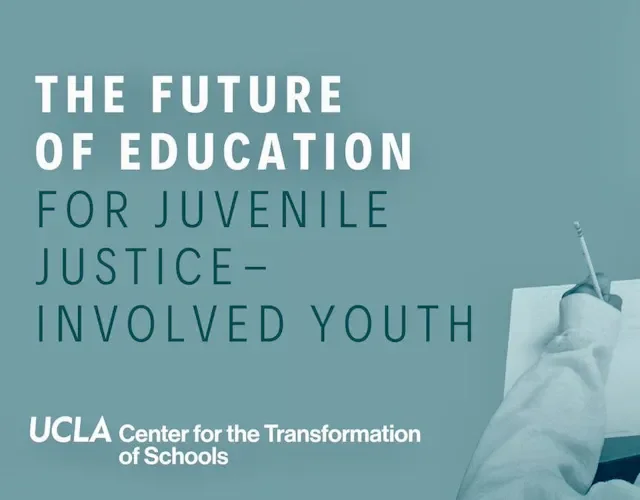Research by UCLA Center for the Transformation of Schools examines Road to Success Academies Model
The UCLA Center for the Transformation of Schools has published the findings of a new study of the implementation of the Road To Success Academies, a comprehensive educational model for juvenile justice schools in Los Angeles County.
The model draws on research-based strategies including positive behavior interventions and supports, efforts to address social emotional learning needs, and curriculum and instruction that is relevant to the lives of the students to advance learning for incarcerated youth.
The study, Centering Care and Engagement: Understanding Implementation of the Road To Success Academies in Los Angeles County Juvenile Court Schools finds that the model shows promise for advancing the delivery of education in juvenile justice settings, but also identifies significant challenges to implementation that need to be addressed to better meet the needs of students.
“The purpose of this study is to introduce the power and potential of the RTSA model in engaging students in carceral settings,” said Angela James, Research Director of the Center for the Transformation of Schools, who led the study. “The study itself brings to bear evidence and information from youth, teachers and administrators about how the model, with its project based, interdisciplinary, thematic focus, actually works in practice. Our hope is that the study results help provide a pathway towards continual improvement in implementation within the juvenile justice system and highlight educational practices that have potential in reaching disengaged students before they find themselves in the juvenile justice system.”
Key Findings of the study include:
· The RTSA model of instruction and intervention is associated with modest gains in reading but not in math.
· Student performance on standardized measures of skill mastery is often well below grade level upon entry into camps and there is often tremendous variation in skill levels among students at each camp at any given time.
· Classroom observations and student interviews suggest high levels of student engagement and excitement about themes and topics explored in project-based learning projects.
· The timing of educational assessments are not uniformly administered at entry and thereafter every 90 days in accordance with policy, making assessment of model impact on direct learning outcomes difficult. The lack of consistency alignment and data-sharing between agencies stymies implementation fidelity.
· Educational delivery services must be coordinated with multiple agencies (Probation and Department of Mental Healt) that have programs and practices that may be in conflict, or that would be better supported with more meaningful coordination.
· High levels of turnover among both administrators, and teaching staff, must be considered in ongoing implementation plans and is critical to achieve successful implementation of RTSA.
· Other educational services offered alongside RTSA (i.e.for credit recovery, and ELL) have not yet been fully aligned to the RTSA model and may depress the overall levels of student engagement.
“I hope this study helps us all better appreciate the potential of education to not only facilitate learning, but also the enjoyment of learning for all students, even those in the most challenging contexts. Education is an important lever for both personal and social change. Honestly, the move towards an equitable and just society depends on transformative education. The RTSA model shows promise in engaging students, I’m hoping that policy makers will see this work as important and young people’s role as central to reimagining juvenile justice,” concludes James.
The full study, Centering Care and Engagement: Understanding Implementation of the Road To Success Academies in Los Angeles County Juvenile Court Schools will be available online Wednesday, August 31. The study’s lead author, Angela James, and professor Tyrone C. Howard, Faculty Director of the Center for the Transformation of Schools, will join with leaders in Los Angeles County for an online briefing and discussion of the study’s findings that day at 12:00 p.m. Register for the briefing here.
The study was prepared by Angela James and Joseph Bishop of the UCLA Center for the Transformation of Schools in collaboration with senior leadership from the Los Angeles County Office of Education, as well as members of the Juvenile Court Schools Team, including the County of Los Angeles Probation Department, Los Angeles County Department of Mental Health Services, and Los Angeles County Health Services. The study was underwritten with the support of the Haynes and The William & Flora Hewlett Foundations.
